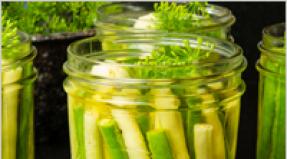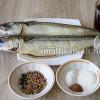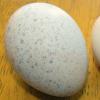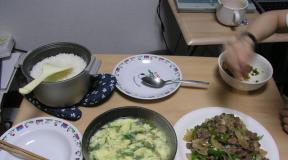Turkey eggs: benefits and harms: how to take them. Turkey eggs - benefits and harm
Europeans first tried turkey eggs thanks to Columbus: the Spaniards brought turkeys from the American continent to their homeland (which is why these birds are often called “Spanish chickens”). Their eggs weigh about 75g, they have a creamy white shell, and the younger the hen, the lighter and smaller her eggs. Although turkeys are raised almost everywhere in the world, their eggs are rarely available. These birds are usually bred for their meat, so the eggs are saved for raising the chicks. However, such eggs can be found in villages or farms.
Collection and storage
It is known that turkeys like to lay eggs in hidden places. Nests are made for each turkey separately, making a hole in the ground and covering it with straw, hay, or placing a low, wide-bottomed basket or box, pouring wet soil in there and laying bedding on top. Like all breeding birds, turkeys have quite large clutches - up to 15 eggs, sometimes 18. Turkeys lay eggs three times a year: from late February to mid-March, from late June to late July, and then at the end of August.
You should not keep turkey eggs next to sharp-smelling foods (cheese, herring, spices), because the eggs quickly absorb all foreign odors. Turkey eggs are well preserved in a saline solution (20 g of salt per 1 liter of water).
You can store turkey eggs by greasing them with linseed oil, a mixture of paraffin and vegetable oil, or a mixture of wax and sunflower oil.
Turkey egg yolks that are not used immediately can be preserved by storing them in a cool place; They will last even longer if you put them in a jar of cold water.
Application
Turkey eggs are prepared in the following ways: baked in the oven, boiled (sometimes salt is added during cooking so that the eggs do not crack), boiled eggs are added to salads, fried, making scrambled eggs or. Also, turkey eggs are cracked (the shell is broken and poured into hot or boiling water), a soufflé is made from whipped whites with sugar and by beating the yolk or the whole egg with sugar. Turkey eggs are added to cocktails, salted or pickled, added when preparing cutlets, etc. A stew is made from egg yolk and crumbled bread. Turkey eggs are much tastier and healthier than chicken eggs.
Beneficial features
Turkey eggs are high-value food products used in therapeutic and preventive nutrition. All nutrients and properties of the egg are in ideal proportions. The chemical composition of eggs is not constant: it depends on the nature of the food and the time when the egg is laid. In therapeutic and therapeutic-and-prophylactic nutrition, in addition to chicken eggs, only turkey eggs are used.
With the constant consumption of turkey eggs, a person experiences improved memory and metabolism, strengthened immunity, and turkey eggs ensure strong hair, nails and teeth.
Calorie content of turkey eggs
Calorie content of turkey eggs - 175 kcal.
A turkey egg is not much different in its properties from a chicken egg, but it is more useful. It has almost the same weight, taste and composition. It was first eaten in America. In Europe, turkey eggs began to be eaten in Spain. This is why turkeys are often called Spanish chickens.
Description of this product
Turkey eggs have the following characteristics:

- the weight of these eggs is 70-75 g. This figure depends on the age of the bird. Young turkeys will have slightly less egg weight than older turkeys;
- Turkey eggs are much healthier than chicken eggs. This is achieved due to the content of more vitamins, minerals, amino acids;
- their shell is very dense, but at the same time quite loose;
- The calorie content of this product is 170 kcal per 100 g;
- they contain a lot of cholesterol. But it does not negatively affect people who decide to lose excess weight. Most experts agree that this cholesterol is beneficial and does not provoke the formation of plaques on the walls of blood vessels, which are characteristic of atherosclerosis;
- the shell is painted a light cream color. There are a large number of small dark dots on its surface;
- The younger the bird that laid the eggs, the lighter they are.
How many eggs does a turkey lay?
Beneficial features
Turkey eggs are a very valuable product that should be included in your diet. Moreover, more useful substances are contained in those that were demolished at the beginning of summer. At this time, turkeys eat a lot of fresh greens, which has a positive effect on the properties of this product.
Regular consumption of turkey eggs will bring the following benefits:

- the body's protective functions will increase;
- strengthens nails, tooth enamel, hair follicles;
- If you include turkey eggs in the diet of children under one year old, you can reduce the risk of developing rickets or osteoporosis. This effect is observed due to the large amount of vitamin D contained in the product;
- metabolism in the body is normalized;
- due to the large amount of protein in this product, it is included in the diet for people who want to lose weight and gain strong muscles;
- if you regularly eat turkey eggs, you can compensate for the deficiency of many vitamins and microelements - A, D, B2, E, B6, iodine, iron, copper, calcium and others;
- the digestion process will improve;
- The activity of the nervous system and brain is normalized.

Dear visitors, save this article on social networks. We publish very useful articles that will help you in your business. Share! Click!
Raw whites and yolks are recommended to be taken orally in case of increased stomach acidity. They have alkaline properties and coat the mucous membrane inside the digestive system. In this way, it is possible to reduce inflammation and reduce pain that can be observed with gastritis.
Application in cooking and cosmetology
Turkey eggs are very healthy and hypoallergenic. Therefore, they must be included even in the diet of children under one year old. They cook quite quickly. To get a hard-boiled egg, you need to boil it for 10 minutes, and soft-boiled - only 3 minutes. This product is eaten fried, baked, or raw. For children, it is best to cook steamed omelettes. It is recommended to add boiled eggs to vegetable salad. They make delicious desserts and pastries that both adults and children will enjoy eating.

This product is also often used for cosmetic purposes. With its help you can prepare a variety of masks, creams, mousses for hair, face and body. With their regular use, the condition of dry and split ends improves and hair follicles are strengthened.
Face masks are suitable for both oily and dry skin types, depending on the additional components used. For example, a mixture of cosmetic clay and protein has drying properties. A mask in which you need to mix yolk with cream, on the contrary, moisturizes the skin.
Despite the large number of beneficial properties, this product can sometimes cause harm to the body. This happens when a person has an allergy or intolerance to some of its components. People with kidney or liver diseases that are associated with problems with the breakdown of proteins should take eggs with caution.

When consuming this product in its raw form, there are, of course, great benefits for the body. But there is no need to abuse this delicacy, since raw protein is poorly absorbed.
Despite the unique composition of the product, it is not recommended to eat it every day, especially if you want to lose weight. For the average person, it will be enough to eat 2-3 pieces a week to get benefits for the body.
Storage rules

Purchasing turkey eggs can be a very challenging task. They are not sold in your regular grocery store. It is also difficult to buy this product from farmers who raise these birds for meat. Typically, one female can reproduce only 15-25 eggs per season, which is why they are so expensive. They are only enough to hatch chicks. But if you search well, you will still be able to find this product, which has a large number of useful properties.
Due to the fact that the shell of these eggs has a loose structure, they can absorb foreign odors. Therefore, do not store them on the same shelf with foods such as raw or smoked meat, herring, citrus fruits, onions or garlic. To reduce the negative effect of various aromas on the taste of eggs, they need to be treated with a special mixture. To do this, mix sunflower, flaxseed oil and paraffin. Apply this mixture to the shell. Turkey eggs can also be placed in a regular saline solution (1 tablespoon of salt per 1 liter of water).
Turkey eggs are a unique product that is very healthy. They should be included in the diet of both adults and children. This product is also recommended to be eaten in moderation by people who want to lose weight without harm to health.
And a little about secrets...
Have you ever experienced unbearable joint pain? And you know firsthand what it is:
- inability to move easily and comfortably;
- discomfort when going up and down stairs;
- unpleasant crunching, clicking not of your own accord;
- pain during or after exercise;
- inflammation in the joints and swelling;
- causeless and sometimes unbearable aching pain in the joints...
Now answer the question: are you satisfied with this? Can such pain be tolerated? How much money have you already wasted on ineffective treatment? That's right - it's time to end this! Do you agree? That is why we decided to publish an exclusive interview with Professor Dikul, in which he revealed the secrets of getting rid of joint pain, arthritis and arthrosis.
Video: Beneficial properties of eggs
The caloric value or energy value of a whole fresh raw turkey egg is about 170 calories. The nutritional value consists of water, ash, cholesterol and saturated fatty acids, as well as proteins, carbohydrates and fats. The vitamin complex includes vitamins B, A and PP. The composition contains trace elements such as iron, selenium and manganese, zinc and copper. Macroelements - calcium, sulfur and phosphorus, magnesium, sodium and potassium.
The benefits of turkey eggs
The most useful eggs are those that were laid in the summer, at a time when the bird feeds mainly on fresh grass.
Thanks to the balanced composition of microelements and vitamins, the use of this product in food will strengthen the immune system and speed up metabolic processes, improve the functioning of the nervous and digestive systems, and brain activity. Turkey eggs have an enveloping effect and have an alkaline reaction, protecting the walls of the stomach from the aggressive effects of harmful factors. Therefore, they are indicated for people with high stomach acidity.
B vitamins help relieve fatigue and help normalize sleep. Phosphorus and calcium are responsible for the regeneration and strengthening of tissues of the skeletal system; also, thanks to these elements, the condition of hair, nail plates and teeth improves. Vitamin A is good for vision, and vitamin E binds free radicals, thereby maintaining the beauty of the skin. Potassium strengthens the cardiac and vascular system, sodium normalizes water balance.
Since eggs do not cause allergic reactions, they are recommended to be included in the diet of young children.
Uses of turkey eggs
Turkey eggs are used in cooking to make omelettes, desserts and smoothies, they are added to salads and in baking dough. If you crack the shell and pour its contents into boiling water, you get poached eggs. Delicacy eggs are consumed boiled, which will take approximately 10 minutes. They can also be fried. You can make a soufflé from the protein, and eggnog from the yolk. You should not eat eggs that have not been heat-treated, as this can harm the stomach, since they are poorly digested and clog the intestines with decay and metabolic products.
In cosmetology, turkey eggs are used to create moisturizing and nourishing masks for hair, face and body; they successfully replace ordinary chicken eggs.
In most cases, these eggs are used for breeding. Only eggs from a healthy individual, of regular shape with a smooth and clean shell, a sedentary yolk in the center and an air sac at the blunt end, are suitable for incubation. All these qualities can be assessed using an ovoscope and visually.
Harm from turkey eggs
People who have an individual intolerance to eggs or problems with protein breakdown due to kidney or liver diseases should avoid using this product. Since turkey eggs are quite high in calories and contain a lot of fat, people who are obese or on a diet should not indulge in them.
Video
Turkey meat is now rapidly gaining popularity in Russia. Yes, it’s a little expensive, but it’s dietary, versatile in preparation and simply very tasty. But turkey eggs remain a delicacy to this day. Many have never even seen them - but in terms of usefulness in the egg family, the turkey simply has no equal. If you find a rare product in a farm shop or directly from the manufacturer, know that you are incredibly lucky.
A little history
Europeans began eating turkey omelettes for breakfast several hundred years ago. It all started with Columbus, who brought turkeys from the New World to the Old. These birds were raised by the ancient Aztecs - and fastidious Europe immediately fell in love with turkey.
Today, the most delicious turkeys are raised in their homeland, the USA, where their eggs are most often eaten. Turkey farms have also begun to actively appear in Russia recently, but you can’t buy a dozen or two nice large eggs in a regular store. Why?
Compared to prolific chickens and industrious quails, turkeys lay eggs quite rarely. The bird has two fertile seasons per year - spring and autumn. In one season, the bird produces only 10-25 eggs, most of which are used to raise offspring. Eggs from the autumn clutch are usually taken for sale - in winter it is too problematic to raise young turkeys. And if you add the fact that birds begin to lay eggs as adults, it becomes clear that it is really difficult to get a gourmet product for the home table.
To do this, you can raise turkeys yourself, make acquaintances with private farmers, or find a trusted store where producers sell their bird “harvest.”
Chicken or turkey?
It is easy to recognize turkey eggs among other eggs. They are one and a half times larger than, weighing about 70 g. The size of the testicle depends on the age of the bird: the younger the hen, the smaller the clutch.
The shell looks porous and loose, but in reality it is very strong; it is difficult to break such an egg. The color of the shell is very beautiful - from creamy to beige, with brown specks.
The high price and inaccessibility of turkey eggs are more than made up for by the advantages of the product. In terms of versatility, it is compared to chicken “brood,” but the turkey has a number of unique features.
- Turkey eggs are eaten willingly, because they do not have a specific egg taste and smell (like, for example, eggs). Therefore, the list of dishes that can be prepared with them is limitless.
- Even small children after one year can eat boiled turkey eggs. This is a hypoallergenic product and practically does not cause individual intolerance.
- Turkey egg dishes contain a rich range of vitamins and minerals. Include them in the menu - this will be a good alternative to synthetic vitamin complexes.
Beneficial features
The chemical composition of a turkey egg is variable. It depends on various reasons: the age of the bird, time of year, diet. The greatest benefit of turkey eggs is in the spring, when the mother hen feeds on fresh green food. This product is especially rich in vitamins, and all valuable substances are balanced.
It’s just that new turkey poults are usually raised from the spring clutch; autumn eggs are much easier to find on sale. But even these contain enough useful components to maintain health in anticipation of frost.
- The calorie content of turkey eggs is not much higher than that of chicken eggs - only 170 kcal. And although such testicles are noticeably larger than those of chickens, you should not be afraid of their fat content. You simply won't buy enough product to eat every day and gain weight because of it.
- The high content of protein (almost 13 grams!) and fat makes turkey breast an ideal dish for athletes. Eating omelettes and scrambled eggs for breakfast will help build muscle mass and provide energy before training and competitions.
- Turkey yolks and whites contain a lot of vitamins A and K. And also almost the entire complex of vitamins B. Vitamin B12 breaks the record for volume - it improves blood composition, strengthens nerves and monitors proper metabolism. Have breakfast with this delicacy regularly - and you will feel your sleep improve, you will become less nervous and less tired.
- This product is generally indispensable for the blood - turkey eggs contain a lot of iron to increase hemoglobin levels. Calcium strengthens bones and helps the heart function. And in order for the mineral to penetrate the cells faster, you need to help it - include dishes with vitamin D in the menu. This is cow and fatty fish or simply.
- Hypoallergenicity and a bunch of vitamins make turkey dishes ideal for expectant mothers. An airy omelet or a light salad with a turkey egg will provide the body with vitamins and is safe for the unborn baby.
What's the harm?
The benefits and harms of turkey eggs are not comparable, but you need to be aware of some dangers.
The main risk for all egg products is salmonellosis. Even if you are 100% sure of the manufacturer, be sure to wash the shell before using it.
Any eggs are heavy food, due to the high percentage of proteins and fats. In case of serious diseases of the kidneys, liver and heart, it is necessary to switch to light meals, and coordinate the diet with your doctor.
If you have an individual intolerance to egg whites and yolks, it is also better to avoid turkey delicacies.
If you have problems with protein digestibility, all egg dishes from the menu will also have to be crossed out, as well as other foods high in protein.
How to select and store?
Turkey eggs also have another advantage over their egg counterparts - their long shelf life. If duck meat can be kept in the refrigerator for only seven days, then turkey meat can be kept in the refrigerator for up to a month. This is due to the thick and strong shell - it perfectly protects the delicate white and yolk, preventing them from spoiling.
But there is a nuance here: always check the category of the product with the farmer. Dietary ones are stored for 10 days, and table ones – up to 30 days.
To choose the healthiest masonry and preserve all the benefits of turkey for a long time, you need to follow simple rules:
- The shell must be strong, clean, without cracks, stuck feathers or traces of droppings.
- Be sure to smell the egg: a fresh one should not smell anything.
- And then shake it: a quality product does not make any bubbling sounds.
- Before using (and if possible, before purchasing), check the freshness. To do this, put a turkey egg in water: a fresh one will immediately sink, but an old one will float up, it’s better not to take this.
- Turkey eggs also need to be stored properly in the refrigerator: their benefits may be lost due to improper proximity. Do not keep strong-smelling foods nearby - fish, spices, onions, smoked meats, etc. The egg will easily absorb odors - and its famous delicate taste will simply disappear.
Turkey eggs in cooking
For cooks, there is simply no dilemma as to whether turkey eggs can be eaten - this is a universal product. Like chicken stock, they can be added to a wide variety of foods:
- omelettes and scrambled eggs;
- cold and warm salads;
- pies, biscuits and pancakes;
- stuffed eggs;
- snack rolls;
- meringues and meringues;
- sandwiches.
Turkey eggs are eaten in a variety of forms - boiled, baked, poached, egg whites on meringue, etc. You can even eat them raw - but infectious disease doctors advise against such experiments due to the risk of contracting salmonellosis.
If you have not yet come across this delicacy, then you may well be wondering how long to boil turkey eggs. Unlike duck and goose, they can be eaten soft-boiled - to do this, just keep them in boiling water for three minutes. It takes 10 minutes to hard boil. And don’t forget to wash the shell before putting it in water - preferably with soap and a brush.
Recipes
Professional chefs and gourmets have a special weakness for turkey eggs. Due to their neutral aroma, they can even be placed in gourmet dishes - there will be no egg taste. Let's talk about unusual recipes with an egg note.
Baked eggs with cheese
This hearty dish is best for breakfast and lunch - double protein and fats take a long time to digest. For dinner it is better to serve something lighter and vegetable.
You will need: 6 boiled turkey eggs, 25 g of shallots (or green onions), a handful, 120 g of sour cream 10%, 150 g of grated cheese, 3 tablespoons of vegetable oil, 30 slices of beef, 6, spices to taste - salt, black pepper and.
Finely chop the onion, chop the garlic, and fry in a frying pan. Add sour cream and spices there and heat for 3-5 minutes.
Place the eggs, cut into halves, into the mold, and on top - diced meat and hard cheese. Pour in the sauce and place in the oven to bake for 20 minutes at 180°C. Sprinkle the finished dish with grated nuts and, if desired, herbs.
Shakshuka with turkey eggs
You will need: 3 eggs, 1 onion and each, a small chili pepper (without seeds), a clove of garlic, 3 large ripe tomatoes, spices to taste (paprika and are best suited)
A couple of hours before cooking, take the main ingredients out of the refrigerator and let them warm up. Pour boiling water over the tomatoes for a short time, then peel and cut. We also chop the onion and bell pepper into small cubes.
Fry the onion in a deep frying pan, add sweet pepper, after 5 minutes add chili and garlic. Simmer for 5 minutes, add the tomatoes, simmer without a lid for another 10 minutes so that the liquid evaporates.
Then we make three depressions in the vegetable mixture and pour an egg into each. Season with salt and pepper and wait until the soft-boiled eggs are baked. The yolk should remain liquid and the white should turn white.
The finished shakshuka is served on warm plates to prevent it from curdling. Before serving, it is better to sprinkle with herbs.
Turkey eggs are practically no different in taste from chicken eggs.
Turkeys first appeared in America. Then, when times passed, these animals were brought to Europe, namely to Spain. In this country they began to be called Spanish chickens.
A turkey egg has a very dense shell with a large number of pores. It is white, closer to cream in color. The entire surface of the shell is covered with small dark dots, and it appears pockmarked. Its weight ranges from 70 to 80 grams. The weight and color of eggs directly depends on the age of the bird. The younger the turkey, the smaller they are, and therefore the color of the shell is not as pronounced.
These wonderful birds are mostly raised on farms. However, there are hobbyists who buy chicks in order to raise them in a private home or even a summer cottage. For Catholics, roasted turkey is a must on the table on Christmas Eve. It becomes clear that they are mainly raised for meat.
It is almost impossible to find turkey eggs on the open market. You can buy them at specialized farms. Turkey lays eggs exclusively in spring and summer. During the season, one turkey can lay no more than 25 eggs. Therefore, they are expensive and difficult to obtain.
Calorie content
The calorie content of one turkey egg is 171 kcal.
Nutritional value per 100 grams
Proteins - 13.68 g (55 kcal), fats - 11.88 g (107 kcal), carbohydrates - 1.15 g (5 kcal).
Unsaturated fatty acids 3.632 g, cholesterol 933 mg, water 72.5 g, ash 0.79 g
This product is very rich in vitamins:
- Vitamin PP 0.024 mg
- Vitamin B12 1.69 mcg
- folic acid 71 mcg
- Vitamin B6 0.131 mg
- Vitamin B5 1.889 mg
- Vitamin B2 0.47 mg
- Vitamin B1 0.11 mg
- Vitamin A 0.166 mg
Also, there is a huge content of such minerals:
- Selenium or sulfur 34.3 mcg
- Manganese 0.038 mg
- Copper 62 mcg
- Zinc 1.58 mg
- Phosphorus 170 mg
- Potassium 142 mg
- Sodium 151 mg
- Magnesium 13 mg
- Calcium 99 mg
Useful properties of turkey eggs
- It is generally accepted that a turkey egg is much tastier than a chicken egg. But we still need to figure out whether it is healthier than chicken. The fact is that turkey eggs contain much more cholesterol than chicken eggs. They occupy third place after quail and guinea fowl in this indicator.
- Turkey eggs are widely used for preparing various dishes. And the prepared dishes are no different from dishes cooked with chicken eggs. Turkey contains a lot of useful substances that are extremely necessary for the growing body, namely children. It has been proven that this product is not capable of causing allergies, so it can be freely given to young children.
- Remember that despite its super beneficial properties, this product should be consumed in moderation. Eat a properly balanced diet and do not overeat.
- Eggs that a turkey laid in early summer have more valuable properties than those laid in early spring, since they contain a large amount of protein in their composition.
- Regular consumption of this product normalizes normal metabolism. In addition, due to the increased content of vitamins, turkey eggs support good immunity. They are indicated for consumption by those people who have problems with the digestive tract. They also have a beneficial effect on the state of the nervous system.
- For those patients diagnosed with gastritis with high acidity, consuming this product will bring exceptional benefits. A raw turkey egg normalizes acid levels in the stomach. It has excellent enveloping properties and also has an alkaline environment. Thanks to this ability to envelop the mucous membrane, damage to the gastric mucosa is prevented.
- Turkey eggs are also widely used in cosmetology. Various masks for skin and hair are prepared from them.
- Turkey eggs are very healthy even for a completely healthy person.



















